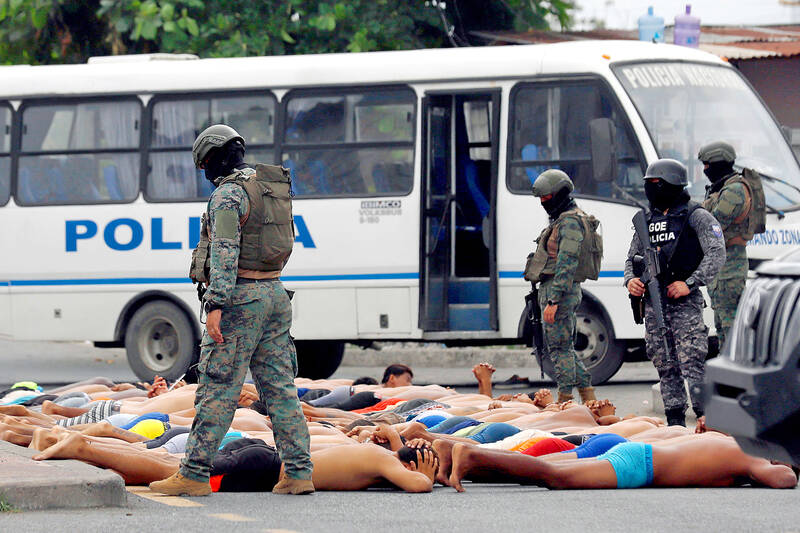Police in violence-plagued Ecuador on Sunday arrested 68 people who had attempted to take over a hospital in the nation’s southwest in the midst of a “war” between drug gangs and the security forces.
The arrests came as Quito agreed with neighboring Andean nations Peru, Colombia and Bolivia to launch a new security network, with the deal reached at an emergency meeting held as the region watches bloodshed spiral in once-peaceful Ecuador.
“We neutralized alleged terrorists who were trying to take over the facilities of a hospital in Yaguachi, Guayas,” police announced on social media.

Photo: AFP
Those detained were believed to be trying to rescue a colleague who was admitted to the hospital with injuries hours earlier, it added.
Firearms and drugs were seized.
Police said they also raided a “rehabilitation center” that housed a gang command center and brothel, and where several alleged gang members were hiding.
Ecuadoran authorities have recently closed hundreds of such centers, essentially gang-run clandestine hospitals that officials say do not have proper facilities for patient care.
Once considered a bastion of peace in Latin America, Ecuador has been plunged into crisis after years of expansion by transnational cartels that use its ports to ship drugs to the US and Europe.
After a recent spate of violence sparked by the prison escape of Adolfo Macias, a drug kingpin known as “Fito,” Ecuadoran President Daniel Noboa imposed a state of emergency and declared the country in a “war” against gangs.
Drug cartels reacted swiftly, threatening to execute civilians and security forces, and taking hostage dozens of police and prison officials, who have since been released.
There are about 20 criminal groups in the country of 17 million people, with membership thought to exceed 20,000.
The violence prompted ministers of Andean countries to create a new “Andean security network” against organized crime, a signed official declaration at an emergency meeting in Lima on Sunday said.
The network will guarantee “a 24/7 service to provide and receive information, and/or request information from other countries ... on the activity of criminal groups that have, or may have, transnational operations,” said the declaration from the Andean Community, composed of Ecuador, Peru, Colombia and Bolivia.
Ecuadoran Minister of Foreign Affairs Gabriela Sommerfeld hailed the agreement as a “new chapter.”
“Fear paralyzes countries,” she said. “We have seen that fear has paralyzed Ecuador, paralyzed investment, increased unemployment and migration.”
Peru and Colombia had already tightened border controls, fearing an influx of criminals fleeing the crackdown in Ecuador.
The US on Sunday also announced that a delegation would visit Ecuador to “consider options to accelerate bilateral security cooperation and discuss collaborative approaches to confront the threats posed by transnational criminal organizations.”
Highlighting the extent of the drug trade in the region, authorities in Colombia and Ecuador over the weekend announced that they had intercepted two semi-submersible vessels loaded with tonnes of drugs in their Pacific waters.
Three people on each vessel were arrested.

Former Nicaraguan president Violeta Chamorro, who brought peace to Nicaragua after years of war and was the first woman elected president in the Americas, died on Saturday at the age of 95, her family said. Chamorro, who ruled the poor Central American country from 1990 to 1997, “died in peace, surrounded by the affection and love of her children,” said a statement issued by her four children. As president, Chamorro ended a civil war that had raged for much of the 1980s as US-backed rebels known as the “Contras” fought the leftist Sandinista government. That conflict made Nicaragua one of

COMPETITION: The US and Russia make up about 90 percent of the world stockpile and are adding new versions, while China’s nuclear force is steadily rising, SIPRI said Most of the world’s nuclear-armed states continued to modernize their arsenals last year, setting the stage for a new nuclear arms race, the Stockholm International Peace Research Institute (SIPRI) said yesterday. Nuclear powers including the US and Russia — which account for about 90 percent of the world’s stockpile — had spent time last year “upgrading existing weapons and adding newer versions,” researchers said. Since the end of the Cold War, old warheads have generally been dismantled quicker than new ones have been deployed, resulting in a decrease in the overall number of warheads. However, SIPRI said that the trend was likely

NUCLEAR WARNING: Elites are carelessly fomenting fear and tensions between nuclear powers, perhaps because they have access to shelters, Tulsi Gabbard said After a trip to Hiroshima, US Director of National Intelligence Tulsi Gabbard on Tuesday warned that “warmongers” were pushing the world to the brink of nuclear war. Gabbard did not specify her concerns. Gabbard posted on social media a video of grisly footage from the world’s first nuclear attack and of her staring reflectively at the Hiroshima Peace Memorial. On Aug. 6, 1945, the US obliterated Hiroshima, killing 140,000 people in the explosion and by the end of the year from the uranium bomb’s effects. Three days later, a US plane dropped a plutonium bomb on Nagasaki, leaving abut 74,000 people dead by the

Indian Prime Minister Narendra Modi is to visit Canada next week, his first since relations plummeted after the assassination of a Canadian Sikh separatist in Vancouver, triggering diplomatic expulsions and hitting trade. Analysts hope it is a step toward repairing ties that soured in 2023, after then-Canadian prime minister Justin Trudeau pointed the finger at New Delhi’s involvement in murdering Hardeep Singh Nijjar, claims India furiously denied. An invitation extended by new Canadian Prime Minister Mark Carney to Modi to attend the G7 leaders summit in Canada offers a chance to “reset” relations, former Indian diplomat Harsh Vardhan Shringla said. “This is a